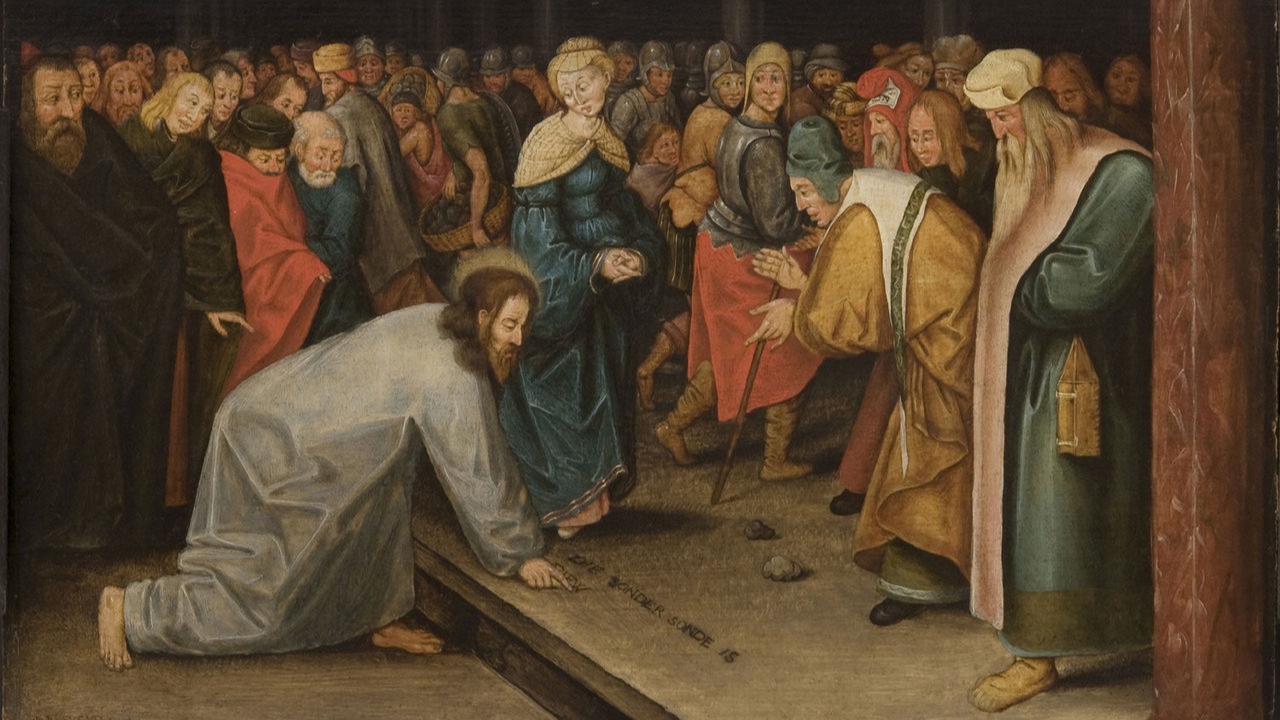What Did Jesus Write?
5th Sunday of Lent (C)
NOTE: This Sunday we enter into the final stage of Lent known as “Passiontide.” We mark this season with the veiling of statues and images in the church. Click here to learn more about this custom.
Whether you believe he is divine or not, there is no question that Jesus has had a greater impact on the course of human history than any other person. So it’s a bit surprising that we don’t have a single written word of his. All that we know about him, his actions, his teachings, and his death and resurrection, come from other people’s accounts of what they witnessed, chiefly those recorded in the four gospels. In fact, there is only one instance in recorded history of Jesus ever writing anything, and we don’t even know what it was.
In the gospel for this Sunday (Jn 8:1-11), the scribes and Pharisees bring a woman caught in adultery before Jesus as he is teaching. Adultery was a capital offense punishable by stoning, according to the law of Moses. But under the Roman occupation, only the Roman government was allowed to carry out executions. So they ask Jesus what he thinks they should do. They think it’s a catch-22. If Jesus says to stone her, they can accuse him of rebellion against Caesar. If Jesus says to let her go, they can accuse him of being unfaithful to Moses. But Jesus escapes their trap by saying, “Let the one among you who is without sin be the first to throw a stone at her” (Jn 8:7). One by one, all of the woman’s accusers leave.
But before he does this, the gospel says, “Jesus bent down and began to write on the ground with his finger” (Jn 8:6). And as the scribes and Pharisees are leaving, he continues to write on the ground. This is the only time in all the gospels that we read about Jesus writing anything. What did he write? John doesn’t tell us.
There has, of course, been speculation for centuries about what it might have been. Perhaps Jesus was writing out the sins of the Pharisees. Some have suggested he was writing the names of those they had committed adultery with themselves, exposing their hypocrisy. Maybe he was just doodling in the sand, showing just how unconcerned he was about the Pharisees’ attempts to confound him. Whatever he wrote, we don’t know, because John didn’t record it.
Why wouldn’t John have included this information? I can think of two reasons. One is that John didn’t know himself. Maybe he saw Jesus writing on the ground, but couldn’t see what Jesus was writing. That’s certainly possible. It’s very likely, however, that even if John didn’t see what Jesus wrote, he would have asked Jesus about it, or at least another disciple who had a better view. The incident seemed to make an impression on John, so it’s only natural that he’d be curious.
The other reason John may have chosen not to record what Jesus wrote is because it wasn’t meant for us. Whatever Jesus wrote may have been meant only for the scribes and Pharisees to see (which would make sense if he was writing out their sins). So even if John knew the content of what Jesus wrote, he may have decided to leave that part out of his gospel account, respecting Jesus’ wishes to keep the information private.
So why include this detail at all, then? Why bother mentioning that Jesus wrote something on the ground if you aren’t going to say what it was? I can think of only one reason, and that’s because it really happened. John records that Jesus bends down and writes something on the ground with his finger, because that’s what John saw Jesus do.
The gospels are full of little details like this; elements that don’t advance the plot or contribute any essential information to the story, but are there simply because that’s what happened. The gospels are not works of fiction. They are eyewitness accounts of what Jesus really said and did. Writers of fiction don’t include details that don’t serve a purpose (especially in pre-printing press days when ink and parchment were at a premium). If John were making up a story about Jesus refusing to condemn a woman caught in adultery, there is no reason for him to include this superfluous detail. But he did, because he knew that everything Jesus did was significant, even if he didn’t understand the full meaning.
And perhaps that’s the real significance of knowing that Jesus wrote something in the sand 2000 years ago that has long since been wiped away — that it really happened. John wrote what he saw. And if that really happened, then so did the raising of Lazarus. So did the water turning into wine. So did the crucifixion. And so did the empty tomb.

